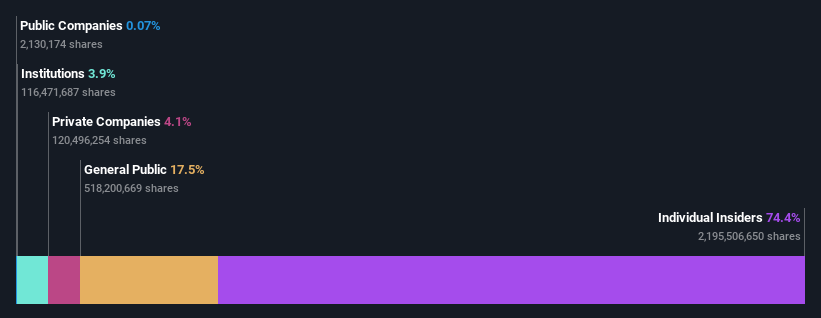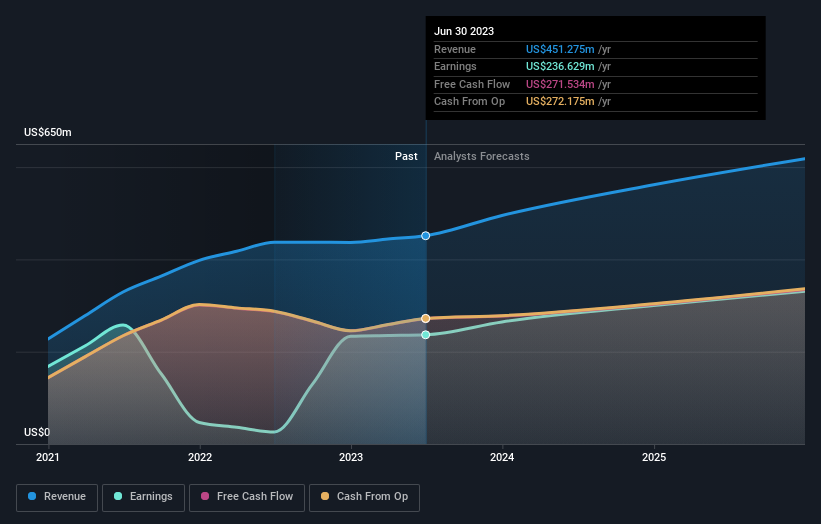GQG Partners Inc.'s (ASX:GQG) Chief Investment Officer Rajiv Jain is the most upbeat insider, and their holdings increased by 4.3% last week
Key Insights
Significant insider control over GQG Partners implies vested interests in company growth
The largest shareholder of the company is Rajiv Jain with a 69% stake
Ownership research along with analyst forecasts data help provide a good understanding of opportunities in a stock
To get a sense of who is truly in control of GQG Partners Inc. (ASX:GQG), it is important to understand the ownership structure of the business. The group holding the most number of shares in the company, around 74% to be precise, is individual insiders. That is, the group stands to benefit the most if the stock rises (or lose the most if there is a downturn).
As a result, insiders scored the highest last week as the company hit AU$4.3b market cap following a 4.3% gain in the stock.
Let's delve deeper into each type of owner of GQG Partners, beginning with the chart below.
See our latest analysis for GQG Partners
What Does The Institutional Ownership Tell Us About GQG Partners?
Institutions typically measure themselves against a benchmark when reporting to their own investors, so they often become more enthusiastic about a stock once it's included in a major index. We would expect most companies to have some institutions on the register, especially if they are growing.
Less than 5% of GQG Partners is held by institutional investors. This suggests that some funds have the company in their sights, but many have not yet bought shares in it. If the company is growing earnings, that may indicate that it is just beginning to catch the attention of these deep-pocketed investors. When multiple institutional investors want to buy shares, we often see a rising share price. The past revenue trajectory (shown below) can be an indication of future growth, but there are no guarantees.
Hedge funds don't have many shares in GQG Partners. Because actions speak louder than words, we consider it a good sign when insiders own a significant stake in a company. In GQG Partners' case, its Chief Investment Officer, Rajiv Jain, is the largest shareholder, holding 69% of shares outstanding. Meanwhile, the second and third largest shareholders, hold 5.6% and 4.0%, of the shares outstanding, respectively. Interestingly, the second-largest shareholder, Timothy Carver is also Chief Executive Officer, again, pointing towards strong insider ownership amongst the company's top shareholders.
Researching institutional ownership is a good way to gauge and filter a stock's expected performance. The same can be achieved by studying analyst sentiments. There are a reasonable number of analysts covering the stock, so it might be useful to find out their aggregate view on the future.
Insider Ownership Of GQG Partners
While the precise definition of an insider can be subjective, almost everyone considers board members to be insiders. The company management answer to the board and the latter should represent the interests of shareholders. Notably, sometimes top-level managers are on the board themselves.
Insider ownership is positive when it signals leadership are thinking like the true owners of the company. However, high insider ownership can also give immense power to a small group within the company. This can be negative in some circumstances.
It seems that insiders own more than half the GQG Partners Inc. stock. This gives them a lot of power. That means insiders have a very meaningful AU$3.2b stake in this AU$4.3b business. Most would argue this is a positive, showing strong alignment with shareholders. You can click here to see if they have been selling down their stake.
General Public Ownership
The general public-- including retail investors -- own 18% stake in the company, and hence can't easily be ignored. While this size of ownership may not be enough to sway a policy decision in their favour, they can still make a collective impact on company policies.
Private Company Ownership
It seems that Private Companies own 4.1%, of the GQG Partners stock. Private companies may be related parties. Sometimes insiders have an interest in a public company through a holding in a private company, rather than in their own capacity as an individual. While it's hard to draw any broad stroke conclusions, it is worth noting as an area for further research.
Next Steps:
It's always worth thinking about the different groups who own shares in a company. But to understand GQG Partners better, we need to consider many other factors. To that end, you should be aware of the 1 warning sign we've spotted with GQG Partners .
If you are like me, you may want to think about whether this company will grow or shrink. Luckily, you can check this free report showing analyst forecasts for its future.
NB: Figures in this article are calculated using data from the last twelve months, which refer to the 12-month period ending on the last date of the month the financial statement is dated. This may not be consistent with full year annual report figures.
Have feedback on this article? Concerned about the content? Get in touch with us directly. Alternatively, email editorial-team (at) simplywallst.com.
This article by Simply Wall St is general in nature. We provide commentary based on historical data and analyst forecasts only using an unbiased methodology and our articles are not intended to be financial advice. It does not constitute a recommendation to buy or sell any stock, and does not take account of your objectives, or your financial situation. We aim to bring you long-term focused analysis driven by fundamental data. Note that our analysis may not factor in the latest price-sensitive company announcements or qualitative material. Simply Wall St has no position in any stocks mentioned.

 Yahoo Finance
Yahoo Finance 

